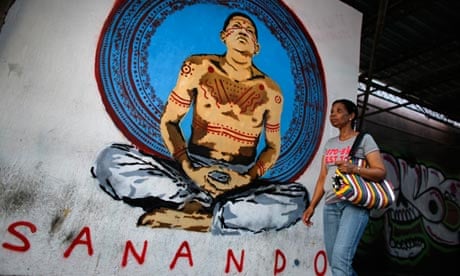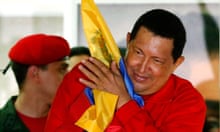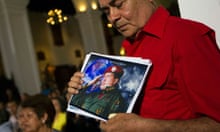Venezuelan intelligence officers have raided the home of a Twitter user suspected of spreading destabilising rumours about the health of Hugo Chávez ahead of an inauguration that the ailing president looks increasingly unlikely to attend.
The alleged microblogger, Federico Medina Ravell is the cousin of a prominent opposition figure, prompting concerns that a long-simmering "information war" could be escalating as the government and its opponents try to fill the vacuum left by a leader who has not been seen or heard in public since he flew to Cuba for emergency cancer surgery a month ago.
The team of Sebin (Bolivarian National Intelligence Service) officers confiscated several computers from Medina's home in Valencia on Sunday night, according to domestic newspapers.
Medina is the cousin of Alberto Federico Ravell, a well-known opposition journalist and co-founder of Globovision, a major news broadcaster and staunch critic of the Chávez government.
Medina, who was not at home, is accused of instigating terrorism through social networking sites. He is said to be behind the @LucioQuincioC Twitter account, which has claimed that Chávez will not return from Havana.
The account remains active and claims to be a collaboration between 20 bloggers in eight cities, mostly overseas. Other Twitter users are mocking Sebin by claiming to have spotted @LucioQuincioC elsewhere, including the peaks of the Andes and drinking cocoa in Calgary.
The raid underpins the heightened political sensitivity ahead of a scheduled swearing-in ceremony on Thursday that seems likely to be postponed amid uncertainty about both Chávez's health and what happens when a president-elect cannot attend his inauguration.
An official health bulletin last week said the president was suffering from complications brought on by a severe lung infection after surgery. The opposition have demanded more detailed information about his prognosis. Foreign news organisations and Twitter accounts have spread rumours that he is in a coma, on a life support system or dead.
One tweet from an account called @estebangerbasi, which has almost 80,000 followers, has called for a nationwide civic strike on 10 January if the inauguration fails to take place, prompting accusations of a coup d'etat in the making from both camps.
Venezuela's vice-president, Nicolás Maduro, rebutted both the speculation and the call for protests on Monday.
"If the opposition or the right is calling for a national civic strike this 10 January our country will respond, you will see our response, work, work and more work", he said during a school visit. He told the children that president Chávez sent them "a kiss and an excited hug".
Last week, he said an opposition spokesperson, Ramón Guillermo Aveledo, was behind the rumour campaign on Twitter and Facebook.
Analysts on the state-backed channel Telesur claimed the government was under information attack. "This is an information war. All through the Bolivarian revolution you have seen this sustained information war. Twitter and the social networks are just extensions of this war," said Cuban journalist and editor of Cubadebate, Rosa Miriam Elizalde.
"We have to confront this impressive power on social networks that is able to destroy the consciousness of a people with ill-intentioned and misconstrued news," added Piedad Córdoba, a Colombian activist and long-time Chávez ally.
Both sides have accused the other of trying to destabilise the country by withholding information or spreading lies. Outsiders have also been blamed for fomenting psychological war. Last Thursday the minister of information, Ernesto Villegas, said international media organisation had spread rumours regarding Chávez's health in an attempt to destroy the Bolivarian revolution.
Last week, opposition spokesman Aveledo said the government should disclose more medical information about Chávez and arrange for him to be replaced temporarily if he cannot attend the Thursday inauguration.
"The real truth of the situation regarding the health of the president must be told given that it is a national problem because this deals with the leader of the country," he said. "Rumours are the offspring of misinformation and that's where the instability begins."
For all the talk of instability and power struggles, however, the streets of Venezuela remain calm.







